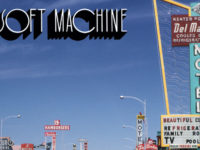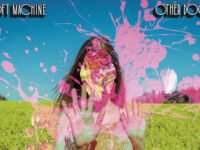Soft Machine will never come to exist again, but one of the best of the Canterbury bands still lives on in an alumni band called Soft Machine Legacy. Together since 2002, the lineup is dominated by members of the underrated mid 70s version of the Softs that had by that time abandoned its psychedelic roots and was firmly in the fusion jazz camp. While founding drummer and singer Robert Wyatt was the charming conscience of the band, Hugh Hopper the boss of the fuzz bass and keyboardist Mike Ratledge a hard edged organ player in a guitar-dominated music world, the next generation were premier jam artists. They didn’t expand appreciably on the ideas of their forbears, but it was nevertheless remarkable that they were able to keep up with their predecessors.
Today’s Legacy has the latter-day Soft Machine’s band’s drummer, John Marshall, their bass player, Roy Babbington and guitarist John Etheridge. Marshall was the eventual replacement for Wyatt in ’72, while Babbington filled in when Hopper left in ’73, and Etheridge joined the band when Alan Holdsworth departed to join Tony Williams’ Lifetime in 1975. All three carried on with saxophonist/keyboardist Karl Jenkins (who had replaced original sax player Elton Dean) until the band fell apart in the late 70s.
History repeated itself when Soft Works, later to become Soft Machine Legacy, was formed in the early 2000’s at the urging of MoonJune Records founder Leonardo Pavkovic, with Marshall, Etheridge, Hopper and Dean. The latter two later passed away in 2009 and 2006, respectively, with Babbington once again replacing Hopper, and Theo Travis assuming the “Karl Jenkins” role, playing tenor sax, flute and electric piano after Dean’s death. As the young guy in the group, Travis isn’t Elton Dean in style; Dean had more avant leanings and a reedier tenor sax, a contrast to Travis’ blues-oriented attack. But Travis is increasingly the guy the British prog elite turn to when woodwinds are needed. He toured and recorded with Daevid Allen’s Gong at the turn of the millennium, made three experimental ambient records with Robert Fripp in the last five years — the latest one examined here recently by Nick DeRiso — and is currently part of Steven Wilson’s incredible new band.
Burden of Proof comes six years after their last studio record, Steam, and it’s the first one after Hopper’s death. His deeply missed fuzz bass is replaced by Babbington’s lithe bottom notes, making this album more comparable to the Soft Machine’s 1976 album Softs at first glance than Legacy’s Steam, since the personnel is nearly the same. But the polished modal minimalism of Softs is replaced by tunes that are more concise and at the same time, looser and less dense. This has that “live in the studio” aura though it wasn’t necessarily recorded that way.
Several of these thirteen tunes do portray a connection to the Ratledge/Dean days of the band, if not the Jenkins/Babbington/Ethridge era. A sinewy jazz walk, accentuated by Ethridge’s tasteful lead, powers “Burden of Proof.” But Marshall is already digging deep in his bag of tricks, as he leaves behind the pace for Babbington and goes double time as Travis takes a sax solo. Ethridge’s extended legato lines over a slinky bass/drums groove makes “Black & Crimson” seem like a lost Bundles track, and Hopper’s “Kings & Queens” from the classic Soft Machine long player Fourth is covered with Babbington faithfully replicating Hopper’s bass riff as Travis replaces Dean’s sax with a flute.
Other times, the group is going for texture and freedom over pure licks, and those tend to be Travis songs, like “Voyage Beyond Seven,” where Ethridge shows off his skill at dropping in effects and loops on the fly in a suspended, rhythm less state. By the end of the song, the whole band has worked itself up to an out-jazz frenzy. “Fallout” is structured in much the same way, with a head/let’s play whatever comes to mind/head sequence. The group improv “Green Cubes” has some interesting moments, but ultimately suffers from too much aimlessness.
The diversity in the music is further underscored by a nearly straight up blues-rock song “Pie Chart,” complete with a muscular sax from Travis, some soul squeezing lead guitar from Ethridge, and, alas, a heated call and response between the two just as the track reaches the fade-out. “The Pump Room” on the other hand is nearly straight up guitar rock with a classic style riff and a fat Babbington bass line; Ethridge assumes a Jeff Beck persona on his solo. And then there’s “The Brief” a drums/sax dual just like Coltrane’s “Countdown,” and Marshall just kills it.
The passing of two key members of the old Soft Machine diminished the living link to the band’s classic period. The legacy of Soft Machine, on the other hand, has survived largely intact here. Burden of Proof is slated for release on March 19, by Pavkovic’s MoonJune Records.
- Christian Marien Quartett – ‘How Long Is Now’ (2024) - April 18, 2024
- Dave Douglas, feat. James Brandon Lewis – ‘Gifts’ (2024) - April 11, 2024
- Thollem – ‘Worlds In A Life, Two’ (2024) - April 8, 2024




